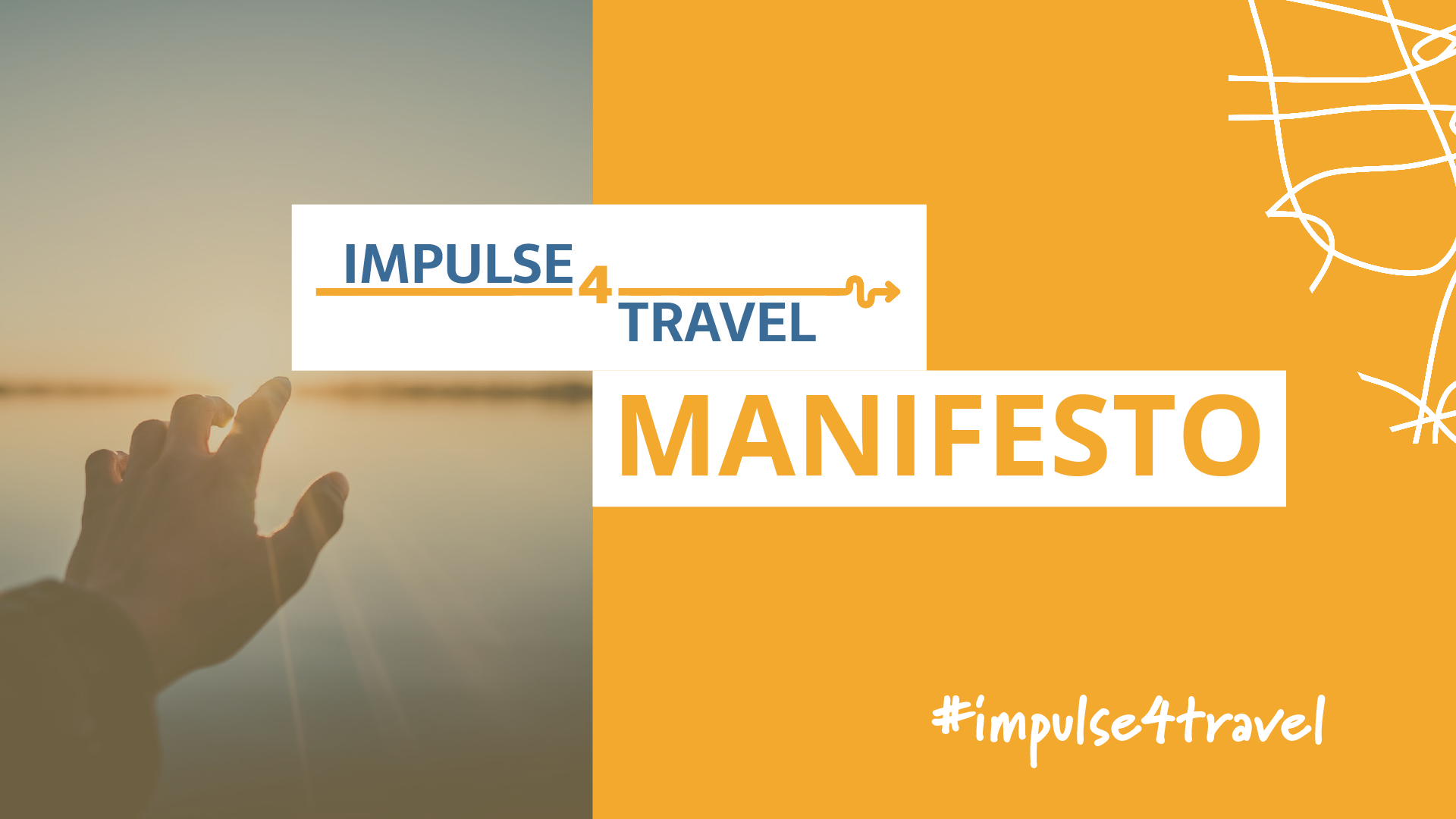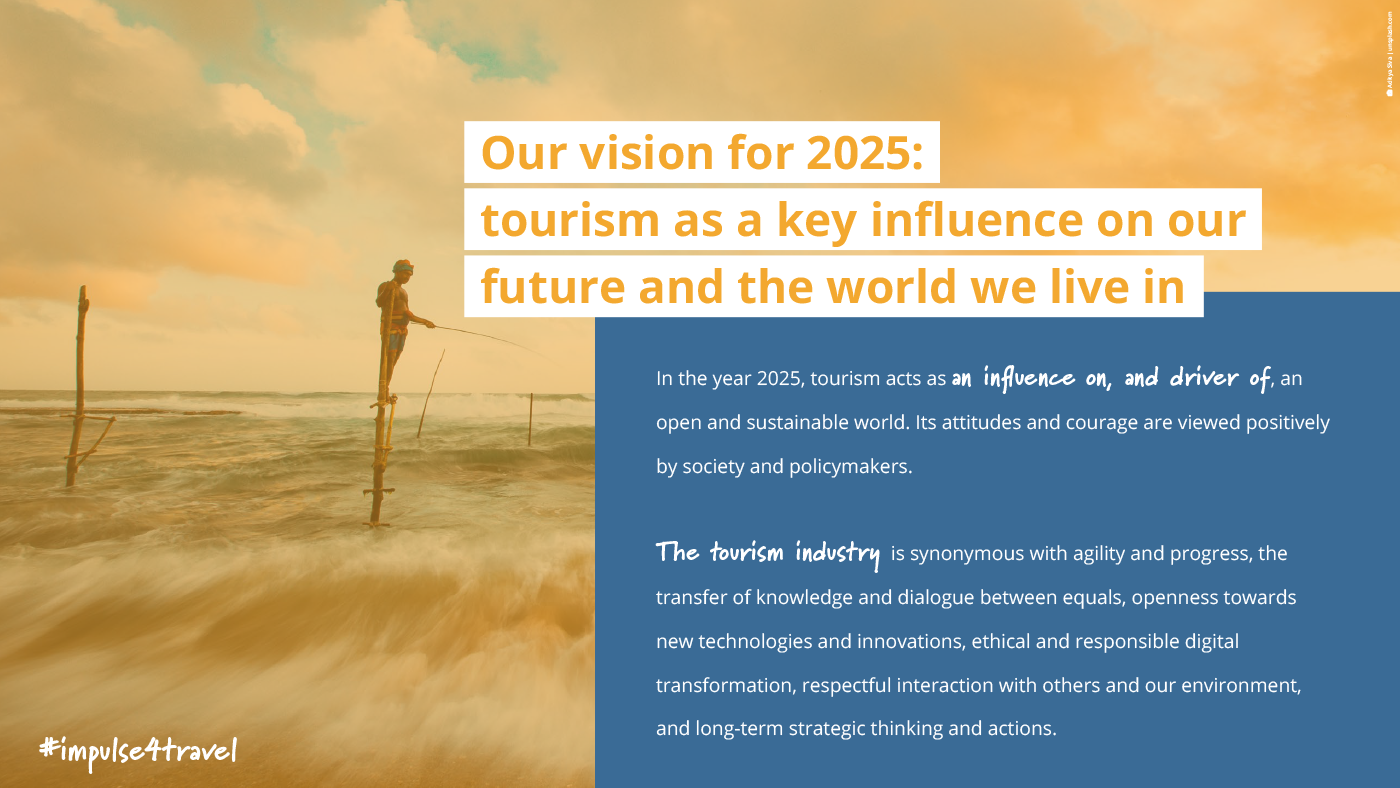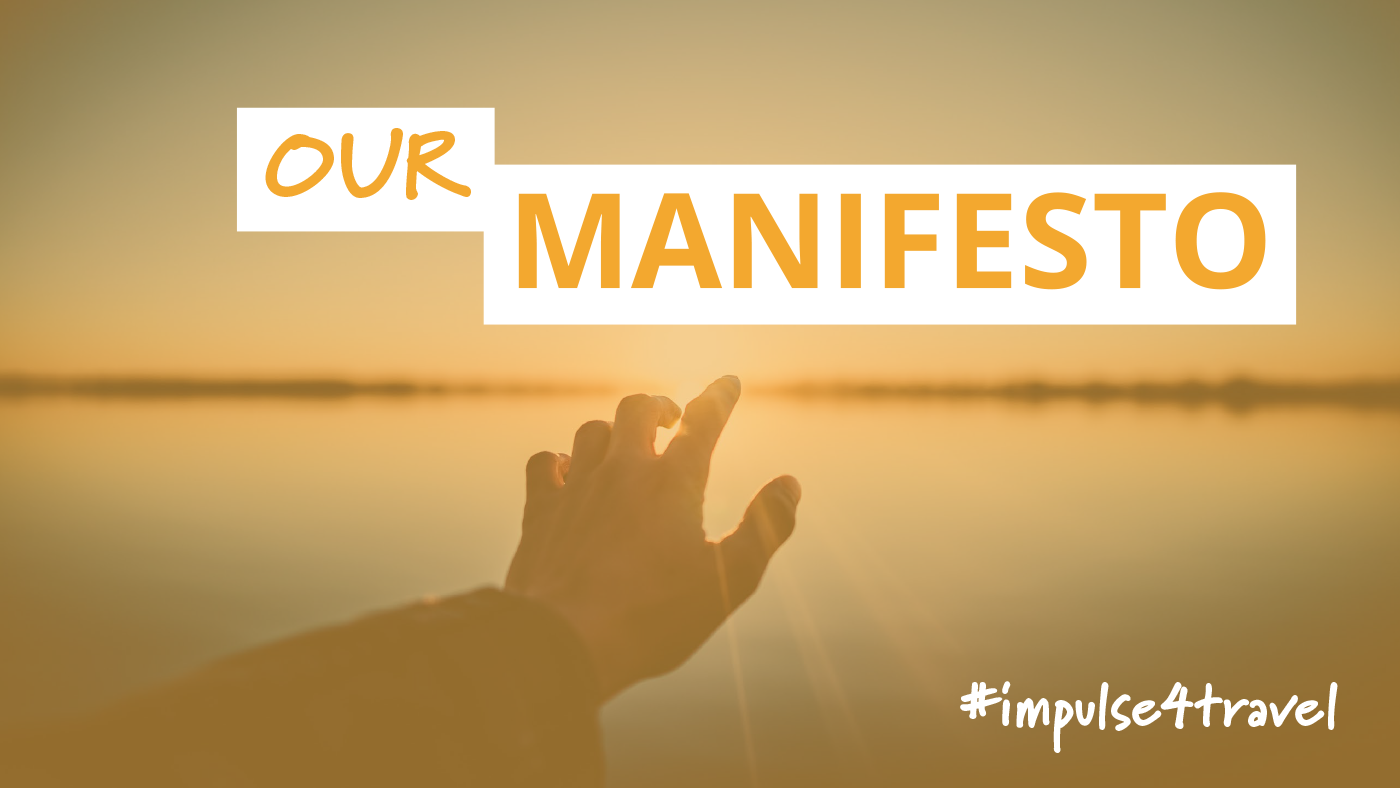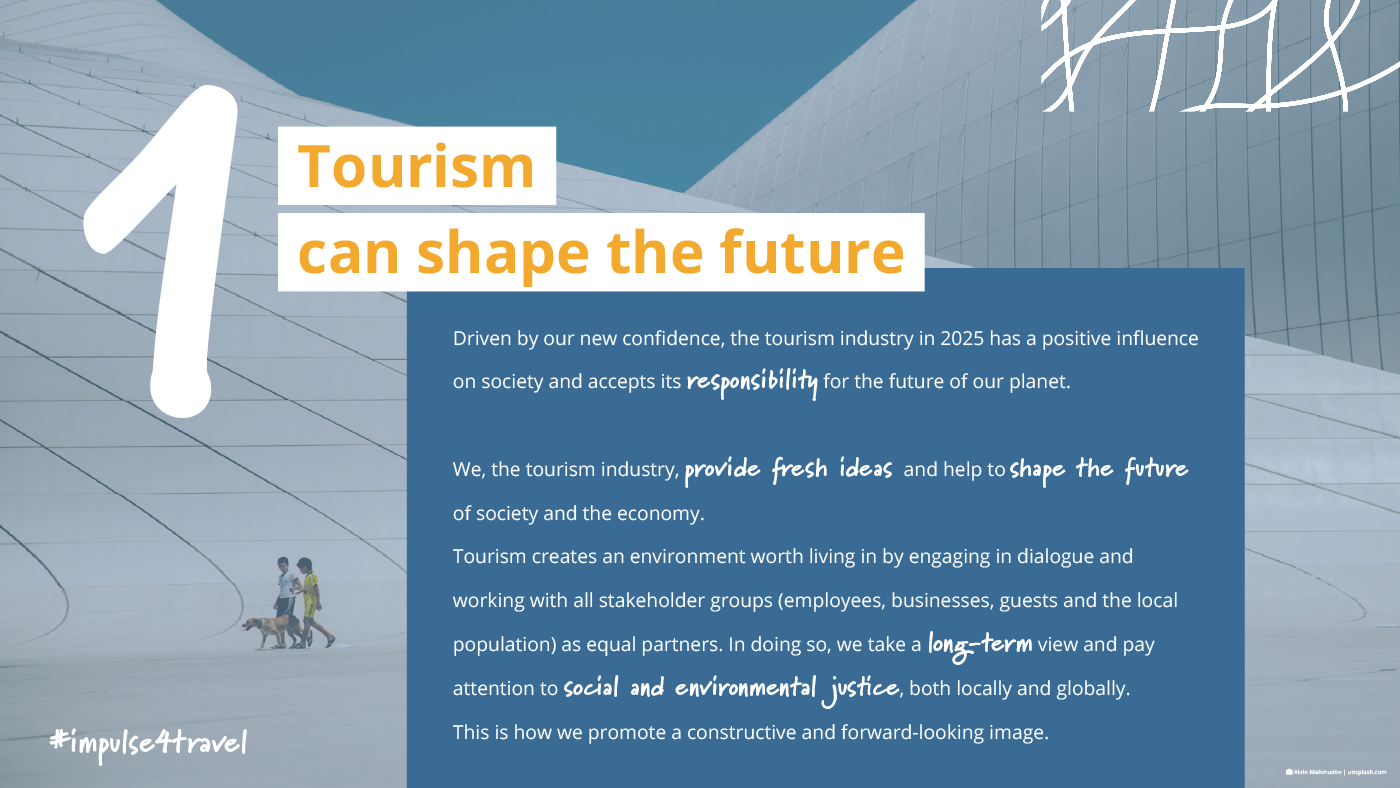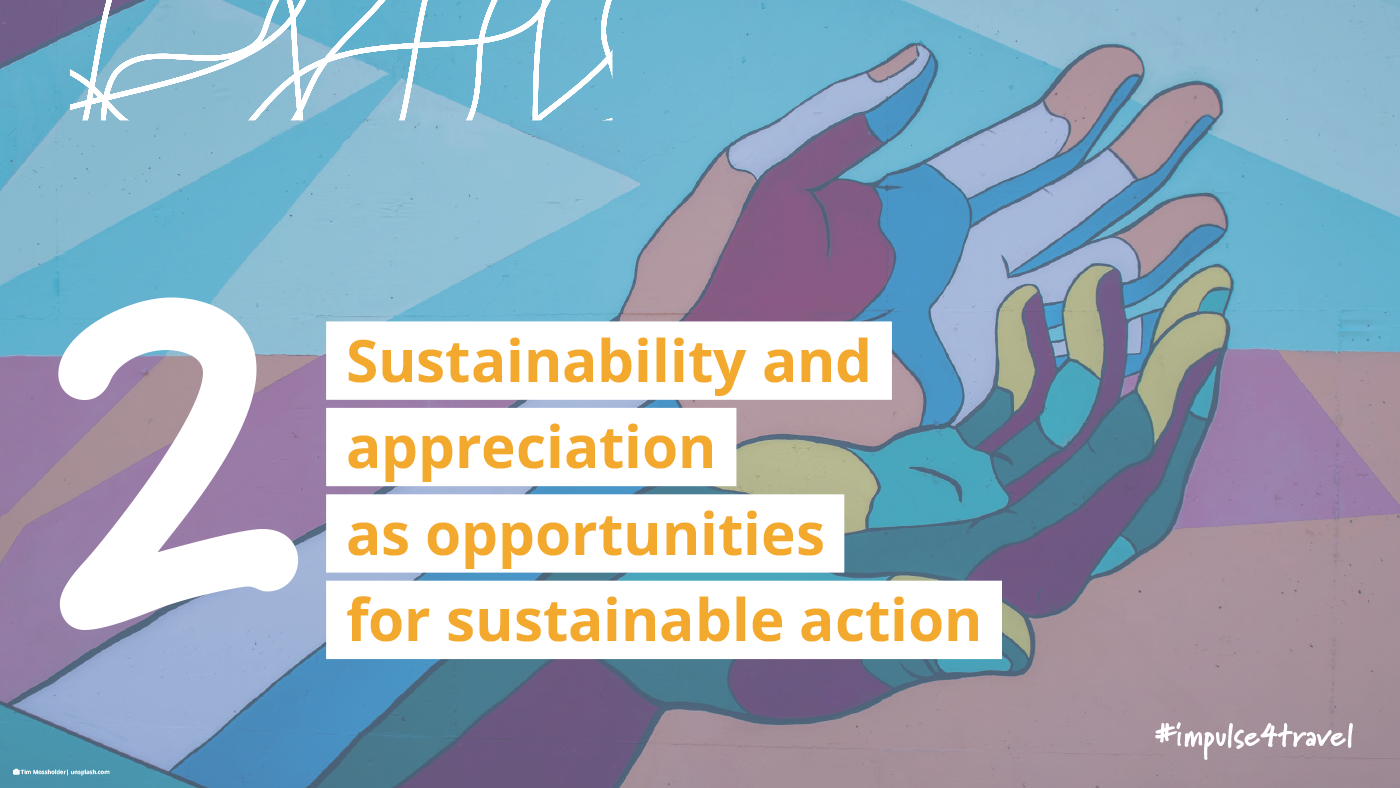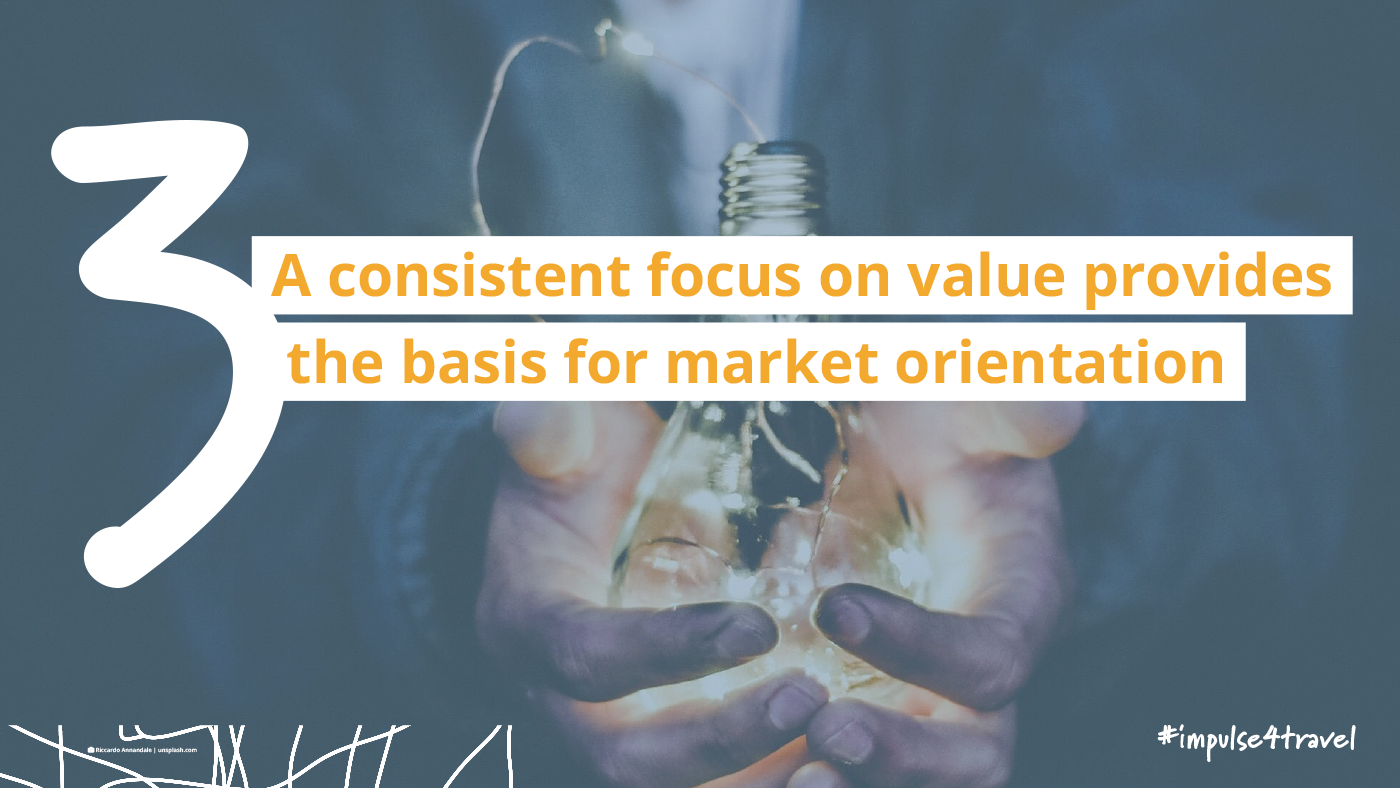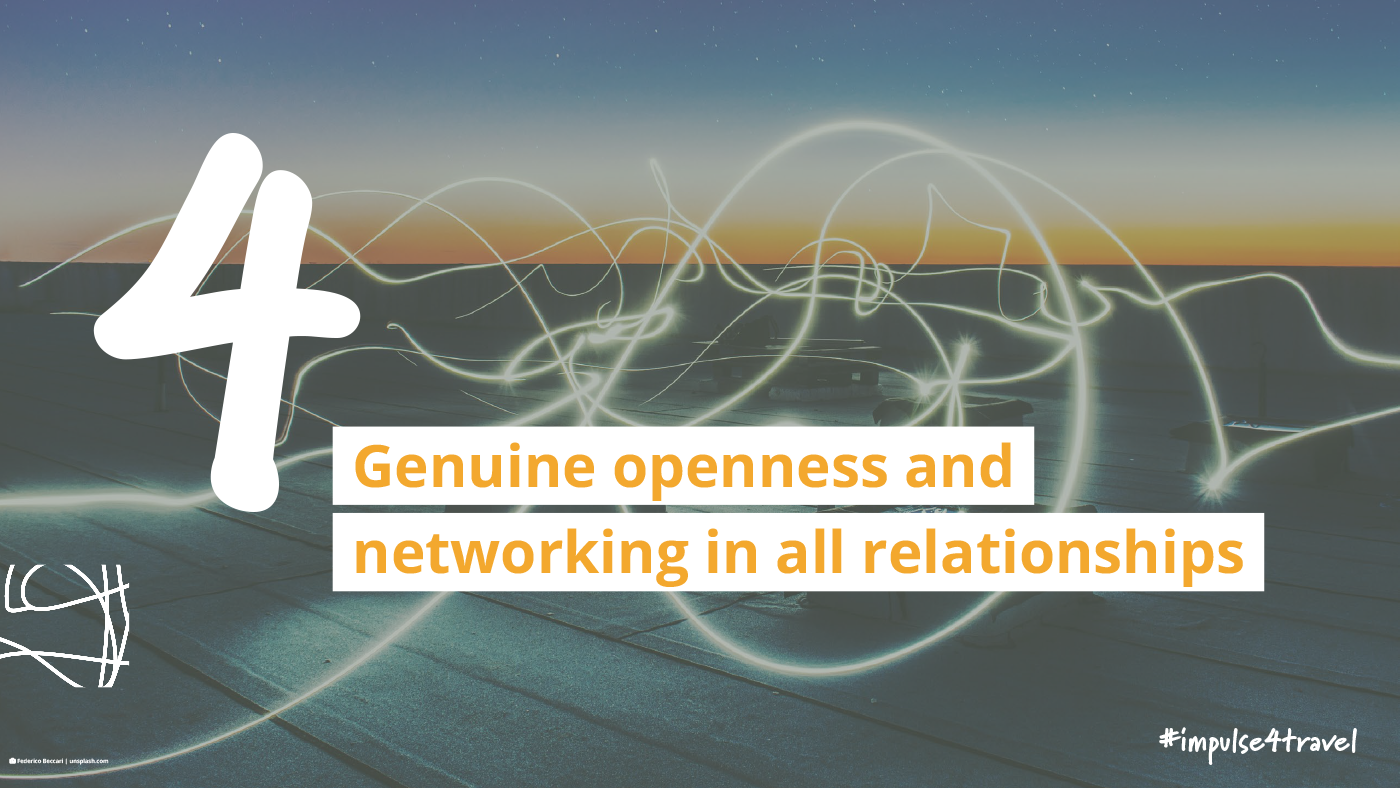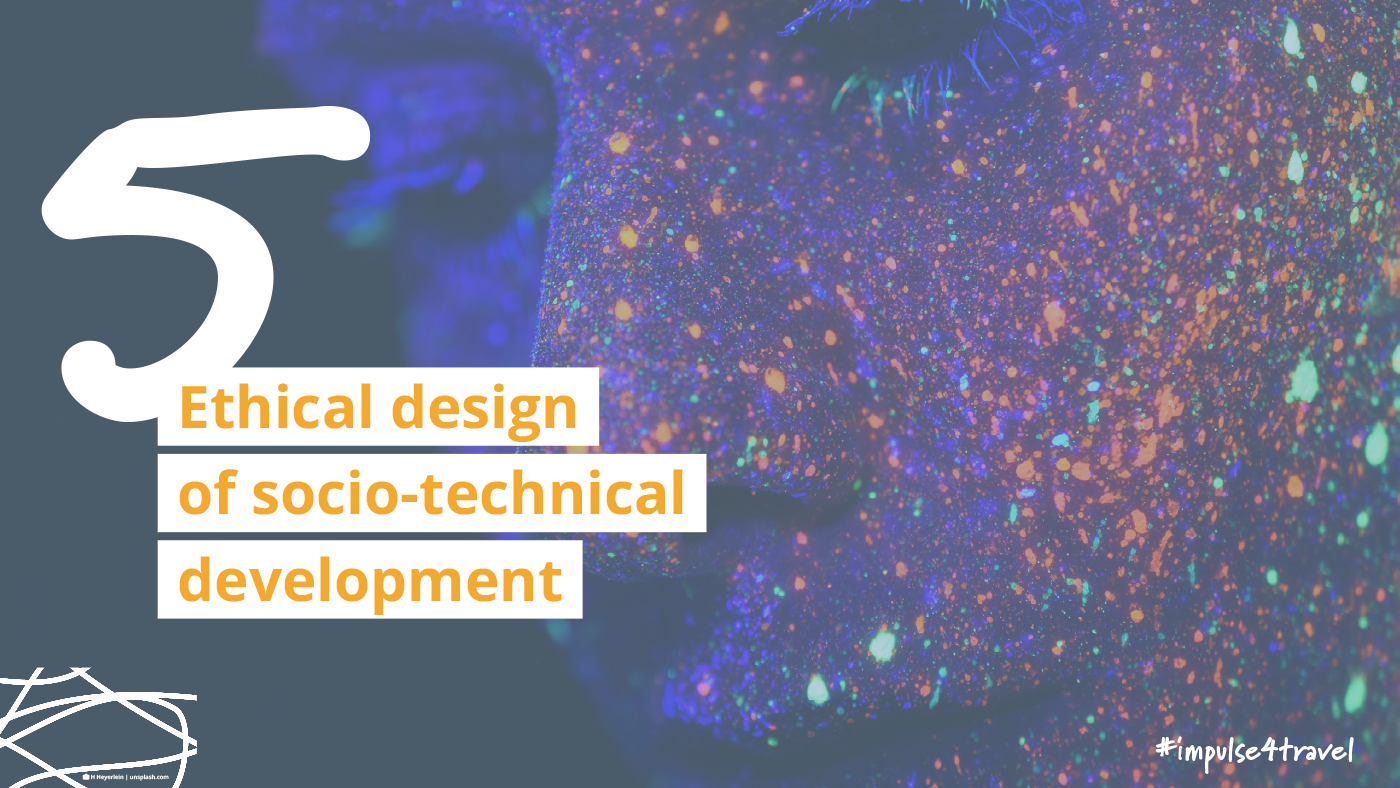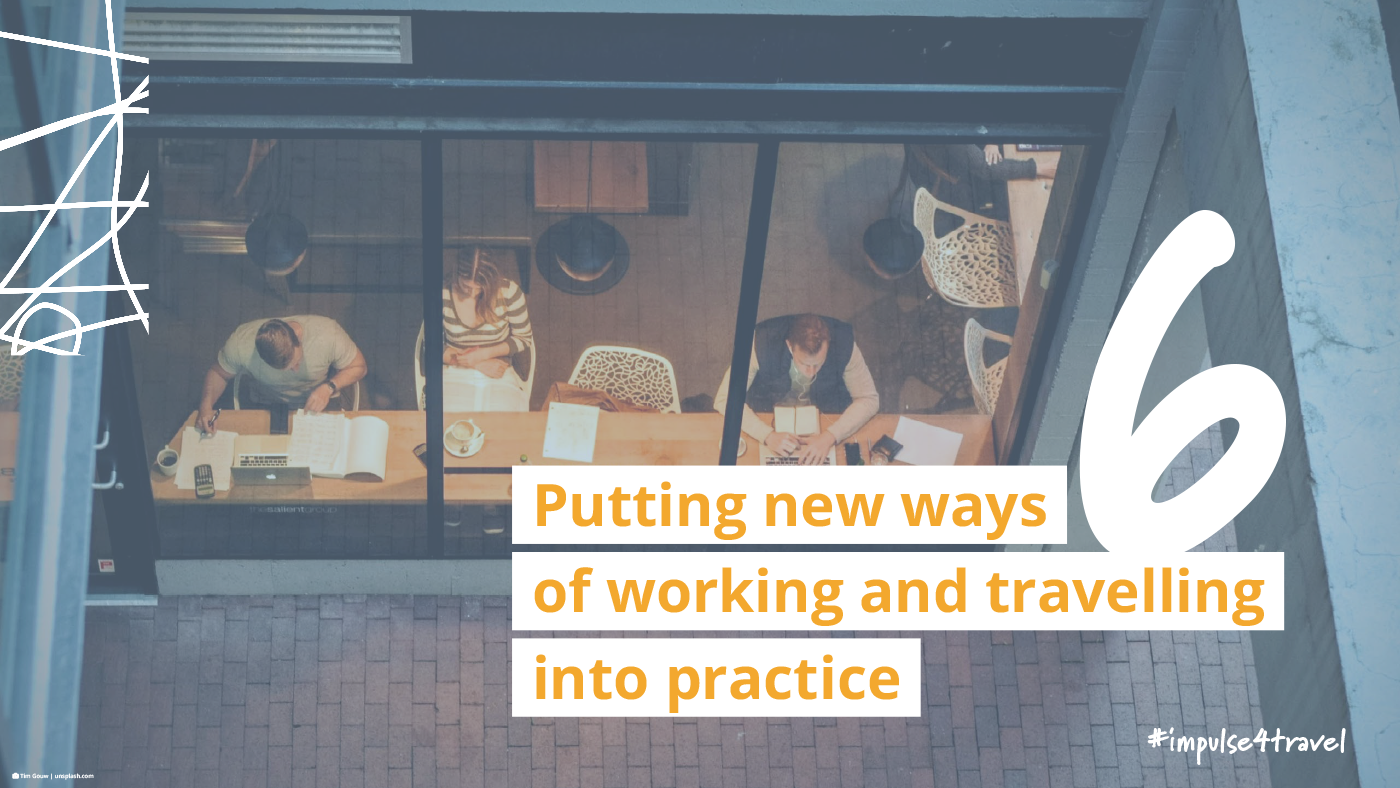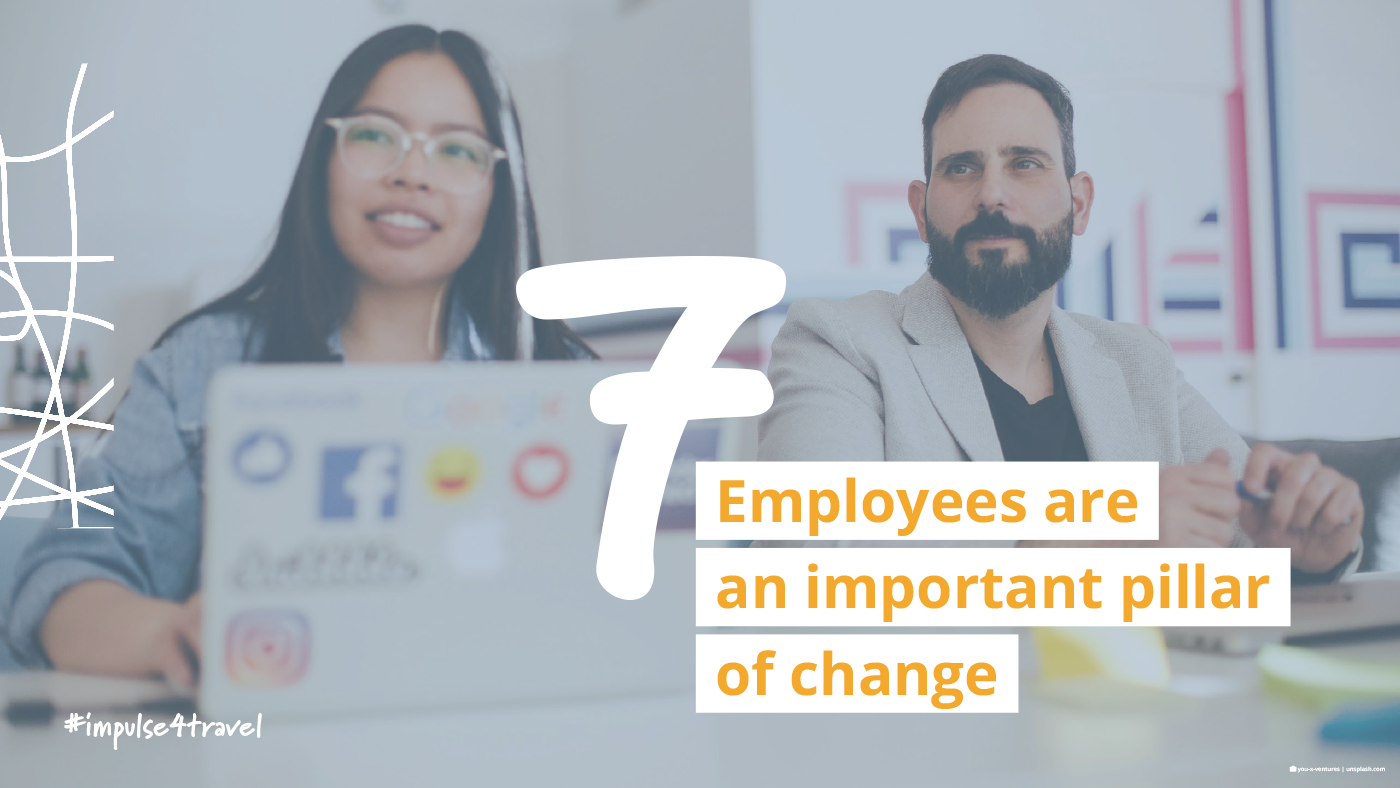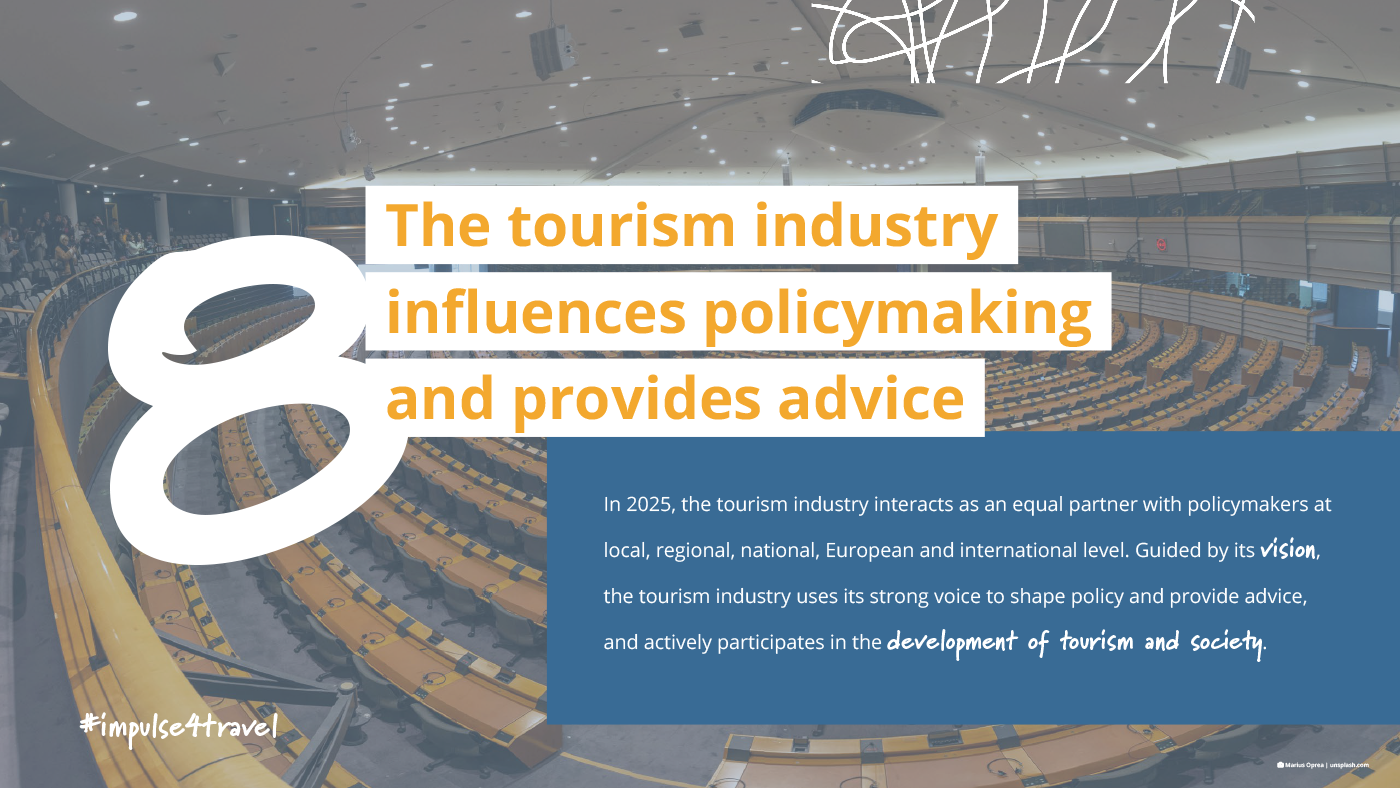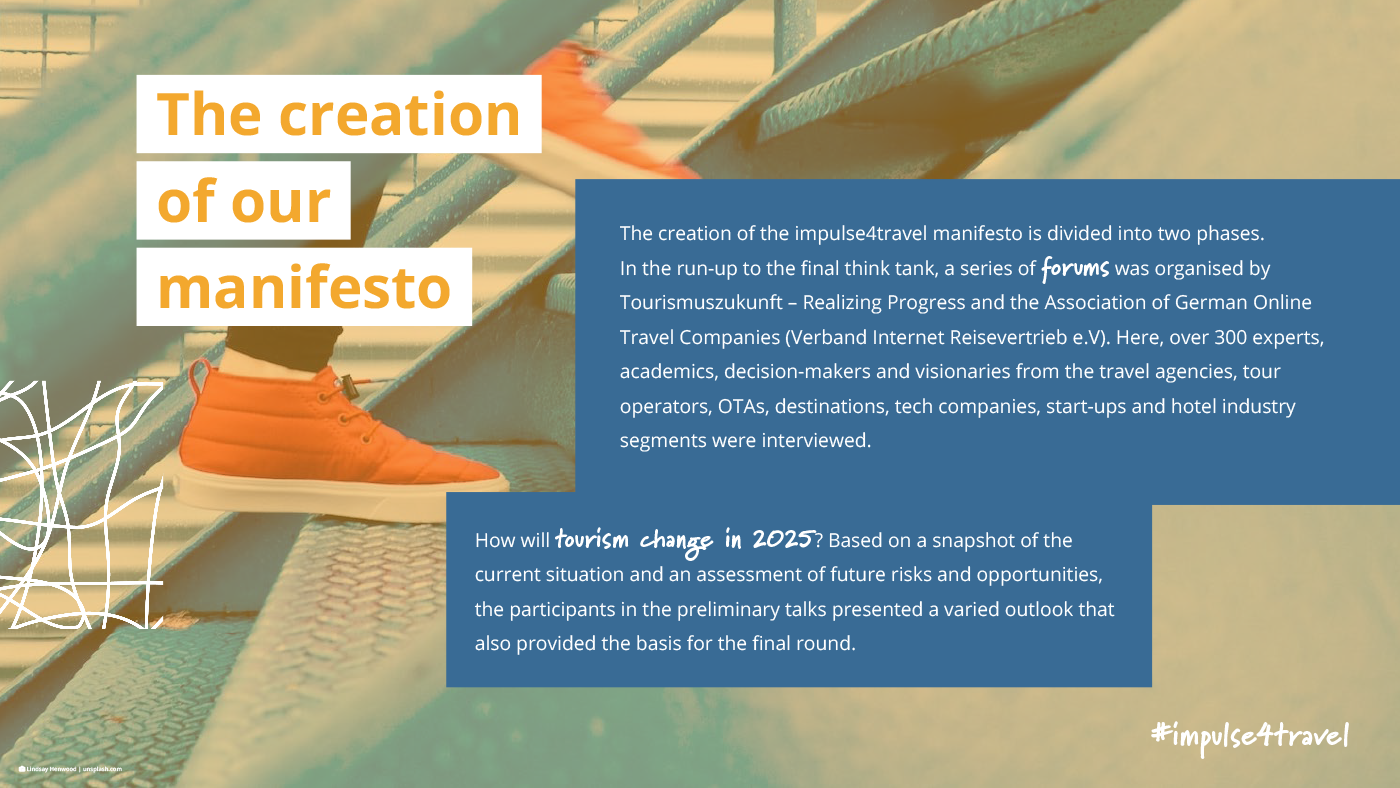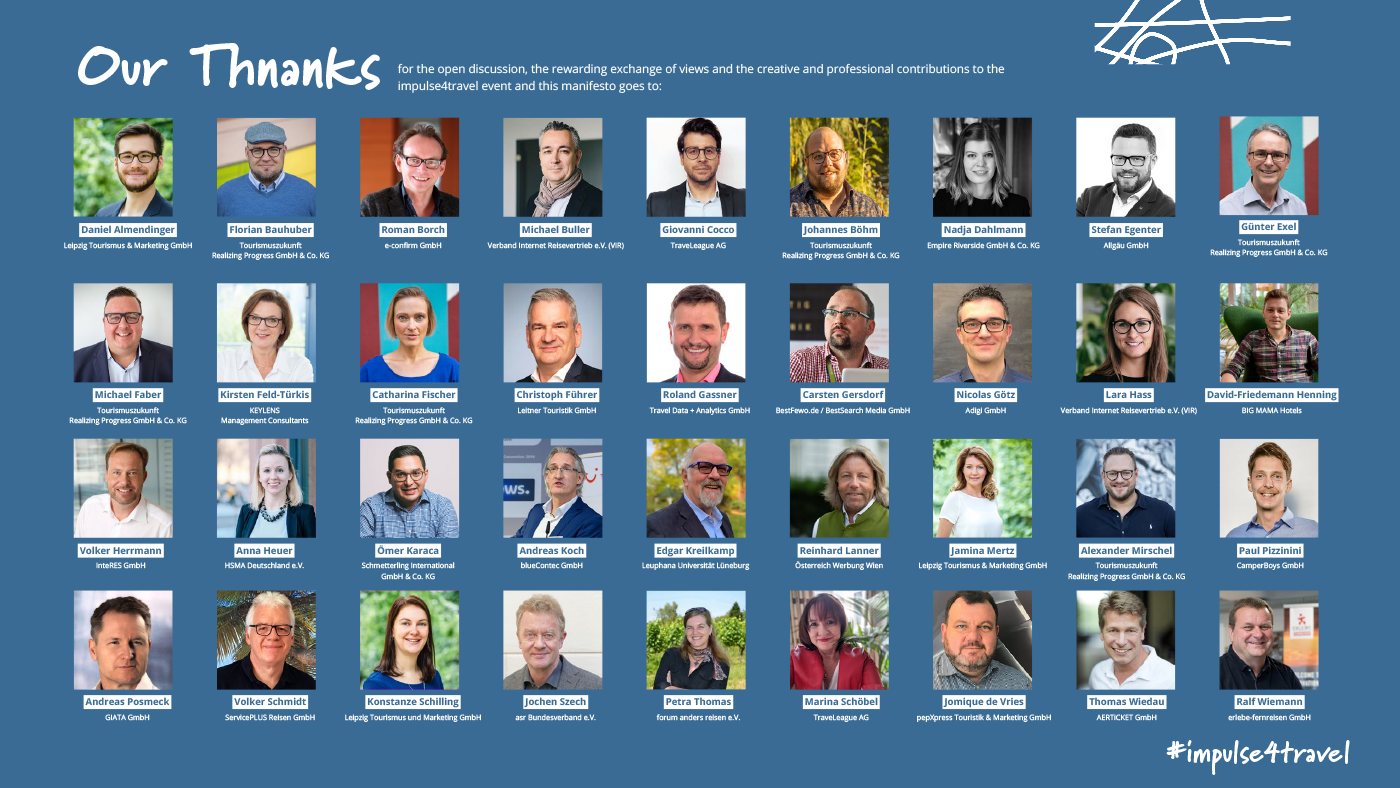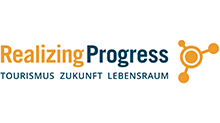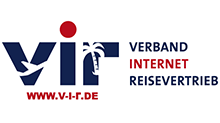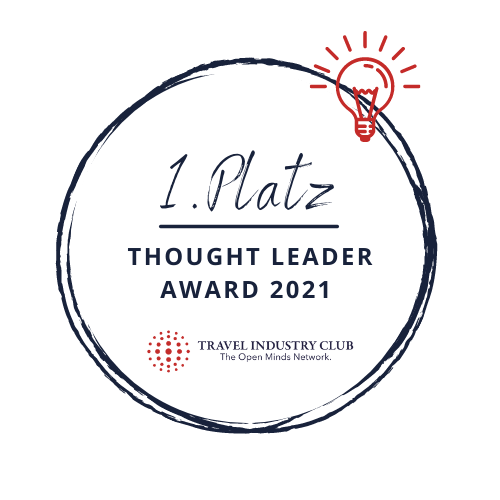The impulse4travel Manifesto
In 2025, tourism, as a creator of the future and living space, points the way to an open and sustainable world: this bold vision is one of the core statements of impulse4travel, an industry-internal thought process of more than 300 stakeholders from the tourism industry. The resulting manifesto was presented by the initiators Realizing Progress and the Verband Internet Reisevertrieb e.V. (VIR) on December 4, 2020.
#impulse4travel online: Overview | Intro | Manifesto | Downloads | Supporters
Check out the presentation on Slideshare.
The #impulse4travel Manifesto
In the year 2025, tourism acts as an influence on, and driver of, an open and sustainable world. Its attitudes and courage are viewed positively by society and policymakers.
The tourism industry is synonymous with agility and progress, the transfer of knowledge and dialogue between equals, openness towards new technologies and innovations, ethical and responsible digital transformation, respectful interaction with others and our environment, and long-term strategic thinking and actions.
In order to meet this expectation, we contribute to society with all our strengths and expertise. We take responsibility and help to shape:
- our companies;
- our working cultures;
- our products and offerings;
- our open data and system architectures;
- our business models and strategies;
- our alliances and networks;
- and the way we communicate
with the aim of achieving positive outcomes for all stakeholders.
The tourism industry as a key influence on our future and the world we live in!
Our vision for 2025: tourism as a key influence on our future and the world we live in
By including the world in which we live in our approach, we are moving the tourism sector’s focus away from pure guest orientation towards a more holistic view in which the interests of local people are given equal consideration.
If we are to fulfil this ambition, the tourism industry has to be heavily involved in regional processes and decision-making. Any negative impact on the local population must be minimised as much as possible, while maximising positive influences on the community, the environment and the economy.
Your role in this manifesto
We are the tourism industry. We decide in which direction we want to take our sector and how we do so. Everyone who works in tourism, no matter in which role, is invited to adopt the thoughts and approaches of this manifesto for themselves and to put them into practice in their thought and actions.
Many aspects of the manifesto have already been discussed in various ways within the industry, but until now the bigger picture and the interdependencies have been missing from the discourse. This manifesto is intended as a shared, all-encompassing vision for the industry. The intention to work towards common goals expressed here gives us the strength to follow this path with purpose, on both a small and a large scale. The task now is to introduce measures, generate some initial successes, develop some positive momentum and instil renewed confidence within our sector.
1. Tourism can shape the future
Driven by our new confidence, the tourism industry in 2025 has a positive influence on society and accepts its responsibility for the future of our planet. We, the tourism industry, provide fresh ideas and help to shape the future of society and the economy.
Tourism creates an environment worth living in by engaging in dialogue and working with all stakeholder groups (employees, businesses, guests and the local population) as equal partners. In doing so, we take a long-term view and pay attention to social and environmental justice, both locally and globally.
This is how we promote a constructive and forward-looking image.
The tourism industry recognises the need for new, more resilient business models. The creation of a new, consistent concept of value indirectly brings with it the opportunity for the industry to readjust price structures and revenue levels with confidence while increasing its resilience against future uncertainties.
Tourism proactively embraces its role as an industry that straddles several sectors, with all the opportunities and challenges that this entails. Talking points such as visitor management, local value creation, progressive mobility concepts and the shaping of experiences in public spaces already go beyond the boundaries of core tourism, paving the way for a more holistic destination and regional management service offering. Tourism can help to promote all-round positive progress, especially in developing countries.
2. Sustainability and appreciation as opportunities for sustainable action
The tourism industry is committed to clear and strong values that foster openness, fairness and appreciation. We take a holistic view of sustainability with all its social, ecological and economic aspects. We see sustainability as an opportunity to prepare ourselves for the future, enhance value creation and become more resilient.
Sustainable thinking serves as a guide for how we shape our value-creation processes and how we select our products, service offerings and relationships.
The tourism industry is leading the way by adding factors such as happiness (satisfaction with life), quality of life and sustainability to its conventional evaluation indicators. These are communicated proactively and transparently in company reports, in reviews and to customers.
3. A consistent focus on value provides the basis for market orientation
In 2025, the tourism industry’s market orientation is no longer price-driven but value-driven. Tourism strategies give equal importance to the values of tourism stakeholders and the needs and wishes of the market segments served. In the mass tourism market, customers have often been approached using what was considered the easiest argument, the price argument, while other selling points were ignored or considered only of secondary importance. This flawed approach must be overcome through strategies and business models that are oriented towards specific values and target groups.
We expect the price argument to continue to play a role in sales strategies, but now alongside a strong value orientation and in line with environmental, economic and social sustainability standards.
4. Genuine openness and networking in all relationships
To live up to its ambitions of promoting innovation, the tourism industry creates networks across geographical and sectoral boundaries. Networking at all levels – globally, internationally, regionally, locally and within organisations – facilitates the creation of productive and meaningful alliances. Common standards and open innovation and design processes form the basis for fair and profitable value chains that are also sustainable.
In 2025, we have access to digital tourism infrastructure, an open system landscape and open data. These enable the tourism industry to harness the potential of algorithms and artificial intelligence for the benefit of users, independently of global data monopolies.
The tourism industry is a leader in digital infrastructures, open data and open system landscapes. These facilitate networking, boost innovation and provide benefits at all levels far beyond the boundaries of our industry, while putting in place the structures for a varied service offering. Applications for end customers, and businesses whose business models are built on them, are enhanced in value by the fact that many users have equal access to them.
5. Ethical design of socio-technical development
Conscious of its social responsibility, the tourism industry discusses ethical issues related to technology, data and social impact, implements them in line with its values and pays particular attention to data protection, equal opportunities, accessibility and inclusivity.
The influence of algorithms and artificial intelligence on all areas of life is growing, and increasingly autonomous technology is having an impact on the real world and on tourism. This changes the perception, organisation and communication of tourism-related content, the flow and the behaviour of visitors, and the tasks and core competencies of people working in tourism.
6. Putting new ways of working and travelling into practice
The greater reliance on digital collaboration, mainly due to the coronavirus pandemic, and the resultant blurring of the boundaries between private and working life are driving the changes to our working culture.
The emergence of new, hybrid types of travel is enhancing traditional forms of MICE and business travel. The tourism industry is conscious of its role in shaping the future in this area and manages change processes in line with its values. Furthermore, the tourism sector is open to all aspects of New Work, is implementing new ways of working and making them available to customers through targeted offers.
As professional and private life increasingly overlap, working hours become more fluid and human interaction is less clearly defined, the boundaries between tourism and non-tourism become more blurred. The result is the workation, a new way of life embraced not just by digital nomads but by many social classes. In response, the tourism industry is creating credible offerings that add value.
The deconstruction of one-dimensional concepts (hotel for overnight accommodation, office for work, etc.) was already under way before the crisis hit. This allows city centres, in particular, to compensate for their reduced attractiveness to visitors resulting from the loss of retailers, arts and entertainment venues and the long-term reduction in office space. New, hybrid places for leisure, work, consumer spending, culture and creativity developed by the tourism industry offer new opportunities and create appealing spaces.
7. Employees are an important pillar of change
As a result of the change processes implemented in line with our vision, the tourism industry in 2025 is an attractive employer paying fair, competitive wages. Technological, social and environmental changes are reflected in new roles and new tasks for, and demands on, employees. The tourism industry is responding to this change by intensifying and transforming its vocational training and boosting professionalisation.
Offline, lecture-style teaching in tourism training is complemented by hybrid formats, such as blended learning, and digital formats, such as e-learning. The focus has shifted away from the static transfer of knowledge towards methodological and interpersonal skills. The new vision and values of the tourism industry are shared and supported by its workforce. When it comes to recruitment, the values and attitudes outlined in this manifesto are given equal weighting with skills and knowledge. Only by persuading people of the manifesto’s merits can we change our industry.
8. The tourism industry influences policymaking and provides advice
In 2025, the tourism industry interacts as an equal partner with policymakers at local, regional, national, European and international level. Guided by its vision, the tourism industry uses its strong voice to shape policy and provide advice, and actively participates in the development of tourism and society.
The creation of our manifesto
The creation of the impulse4travel manifesto is divided into two phases. In the run-up to the final think tank, a series of forums was organised by Tourismuszukunft – Realizing Progress and the Association of German Online Travel Companies (Verband Internet Reisevertrieb e.V). Here, over 300 experts, academics, decision-makers and visionaries from the travel agency, tour operator, OTA, destination, tech company, start-up and hotel industry segments were interviewed.
How will tourism change in 2025? Based on a snapshot of the current situation and an assessment of future risks and opportunities, the participants in the preliminary talks presented a varied outlook that also provided the basis for the final round.
During the impulse4travel think tank held from 29 to 31 October 2020, 30 experts met online to share and discuss their views on the state of tourism in 2025. Political, legal, economic, environmental, socio-cultural and technological aspects were examined in several world café rounds. The following questions were the focus of each round of discussions:
1. What overall trend can be seen?
2. What impact will this have on tourism?
3. What options for action are available to the tourism industry?
4. What position/approach should we take?
The results of these talks are mirrored in the impulse4travel manifesto.
Our thanks!
Our thanks for the open discussion, the rewarding exchange of views and the creative and professional contributions to the impulse4travel event and this manifesto go to:
Daniel Almendinger (Leipzig Tourismus & Marketing GmbH), Florian Bauhuber (Realizing Progress GmbH & Co. KG), Roman Borch (e-confirm GmbH), Michael Buller (Verband Internet Reisevertrieb e.V. (VIR)), Giovanni Cocco (TraveLeague AG), Johannes Böhm (Realizing Progress GmbH & Co. KG), Nadja Dahlmann (Empire Riverside GmbH & Co. KG), Stefan Egenter (Allgäu GmbH), Günter Exel (Realizing Progress GmbH & Co. KG), Michael Faber (Realizing Progress GmbH & Co. KG), Kirsten Feld-Türkis (KEYLENS Management Consultants), Catharina Fischer (Realizing Progress GmbH & Co. KG), Christoph Führer (LEITNER TOURISTIK GmbH), Roland Gassner (Travel Data Analytics), Carsten Gersdorf (BestFewo.de / BestSearch Media GmbH), Nicolas Götz (Adigi GmbH), Lara Hass (Verband Internet Reisevertrieb e.V. (VIR)), David-Friedemann Henning (Big Mama Hotels), Volker Herrmann (InteRES GmbH), Anna Heuer (HSMA Deutschland e.V.), Ömer Karaca (Schmetterling International), Andreas Koch (bluecontec GmbH), Edgar Kreilkamp (Leuphana Universität Lüneburg), Reinhard Lanner (Österreich Werbung Wien), Jamina Mertz (Leipzig Tourismus & Marketing GmbH), Alexander Mirschel (Realizing Progress GmbH & Co. KG), Paul Pizzinini (CamperBoys GmbH), Andreas Posmeck (GIATA GmbH), Volker Schmidt (ServicePLUS Reisen GmbH), Konstanze Schilling (Leipzig Tourismus und Marketing GmbH), Jochen Szech (asr Bundesverband e.V.), Petra Thomas (forum anders reisen e.V.), Marina Schöbel (TraveLeague AG), Jomique de Vries (pepXpress Touristik & Marketing GmbH), Thomas Wiedau (AERTICKET GmbH), Ralf Wiemann (erlebe-fernreisen GmbH).
Licensing of this document: CC BY 2.0 DE
Sponsors & Partners
A thank you to all who make impulse4travel possible
THOUGHT LEADER AWARD 2021
impulse4travel acknowledged as outstanding project by the Travel Industry Club

